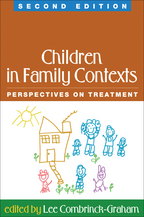Children in Family Contexts
Second Edition
Perspectives on Treatment
Edited by Lee Combrinck-Graham
Hardcovere-bookprint + e-book
Hardcover
orderMarch 16, 2006
ISBN 9781593852634
Price: $88.00524 Pages
Size: 6⅛" x 9¼"
Sign up for emails on upcoming titles on Families & Couples (with special discounts)!
“This is a diverse text whose authors present a variety of theoretical ideas and practical ways of working. The first part of the book offers a useful textbook style approach to promoting child-in-family thinking and working and would be of interest and potential value to anyone involved in working with children and their families. In my opinion, the most interesting sections of the book followed, in the chapters referring to specific or specialist areas for service provision. Although these chapters will be more or less relevant to professionals working in different services, the authors present a depth of knowledge, experience, and reflection about the different issues presented, alongside on obvious enthusiasm for improving the understanding of children and the contexts of their lives and incorporating this into clinical work. The chapters stand alone, so are easily accessible and the style of the collection makes the book alive and interesting enough to be read as a whole.”

—Clinical Child Psychology and Psychiatry
“Emphasizing the transactional relationship between child development and family process, this book provides broad and deep coverage of contemporary families. Each chapter offers specific approaches to intervention. In this new edition, the chapters on attachment disorders, school-based interventions, family violence, and legal issues are particularly relevant and valuable. This book will be useful in graduate family therapy courses in all the mental health disciplines, and will also be a valued reference for child and family therapists.”

—Douglas Davies, MSW, PhD, School of Social Work, University of Michigan
“This thoughtfully revised and significantly expanded volume continues to support clinicians who seek to bridge theory and practice in our increasingly complex ecology. It offers important perspectives on children in all contexts, within the widened scope of school, court, and other community systems, as well as the intrafamilial. The editor not only selects developmental and other theoretical lenses to facilitate understanding, but also provides data-based models with which to intervene. This book can help shape more apt interventions for families dealing with life’s vicissitudes, both acute and chronic—for example, single parenthood, parental divorce and remarriage, family illnesses and deaths, alcoholism, violence, and immigration.”

—Fred Gottlieb, MD, Family Therapy Institute of Southern California
“This second edition is an excellent successor to a classic work in the field. The volume focuses on issues pertinent to children and their families in the 21st century, paying thoughtful attention to such new topics as children in foster families and the many cultures of child protection. Consistent with the current zeitgeist, an emphasis is now placed on the biology of family culture and family therapy in an age of biological psychiatry. This highly readable book is an absolute 'must' for all family therapy educators. As a text, it will help students develop a child-in-family way of thinking and learn to apply this approach in assessment and intervention with families. Practicing clinicians will appreciate this book as well, and will find it comprehensive, informative, and engaging.”

—Nadine J. Kaslow, PhD, ABPP, Department of Psychiatry, Emory University; past president, American Psychological Association
—Clinical Child Psychology and Psychiatry
“Emphasizing the transactional relationship between child development and family process, this book provides broad and deep coverage of contemporary families. Each chapter offers specific approaches to intervention. In this new edition, the chapters on attachment disorders, school-based interventions, family violence, and legal issues are particularly relevant and valuable. This book will be useful in graduate family therapy courses in all the mental health disciplines, and will also be a valued reference for child and family therapists.”
—Douglas Davies, MSW, PhD, School of Social Work, University of Michigan
“This thoughtfully revised and significantly expanded volume continues to support clinicians who seek to bridge theory and practice in our increasingly complex ecology. It offers important perspectives on children in all contexts, within the widened scope of school, court, and other community systems, as well as the intrafamilial. The editor not only selects developmental and other theoretical lenses to facilitate understanding, but also provides data-based models with which to intervene. This book can help shape more apt interventions for families dealing with life’s vicissitudes, both acute and chronic—for example, single parenthood, parental divorce and remarriage, family illnesses and deaths, alcoholism, violence, and immigration.”
—Fred Gottlieb, MD, Family Therapy Institute of Southern California
“This second edition is an excellent successor to a classic work in the field. The volume focuses on issues pertinent to children and their families in the 21st century, paying thoughtful attention to such new topics as children in foster families and the many cultures of child protection. Consistent with the current zeitgeist, an emphasis is now placed on the biology of family culture and family therapy in an age of biological psychiatry. This highly readable book is an absolute 'must' for all family therapy educators. As a text, it will help students develop a child-in-family way of thinking and learn to apply this approach in assessment and intervention with families. Practicing clinicians will appreciate this book as well, and will find it comprehensive, informative, and engaging.”
—Nadine J. Kaslow, PhD, ABPP, Department of Psychiatry, Emory University; past president, American Psychological Association



